Imagine, chatGPT becomes the priority for conversation. How good is it for answering questions and seeking advice about mental health – a sensitive “human” topic? Something AI doesn’t yet comprehend at an intimate level!
Considering how chatGPT is a language model based on a huge amount of human knowledge, how will it fare if I ask it simple mental health questions? How good will the advice and explanations be?
So I asked chatGPT (May 24 2023 free version) 5 questions I get asked a lot and analyzed them. I’ll leave a short commentary on all of its responses to my questions and give them a score.
- Question 1: What is mental health according to you in 100 words?
- Question 2: What should I do if I wake up very tired and keep losing focus all day long?
- Question 3: Why am I not feeling anything in life? Have I gone cold or am I depressed?
- Question 4: What 5 things can I do to protect my mental health at a very stressful job?
- Question 5: I just had a breakup and I am depressed, what should I do?
- Question 1: What is mental health according to you in 100 words?
- Question 2: What should I do if I wake up very tired and keep losing focus all day long?
- Question 3: Why am I not feeling anything in life? Have I gone cold or am I depressed?
- Question 4: What 5 things can I do to protect my mental health at a very stressful job?
- Question 5: I just had a breakup and I am depressed, what should I do?
- Takeaway
Question 1: What is mental health according to you in 100 words?
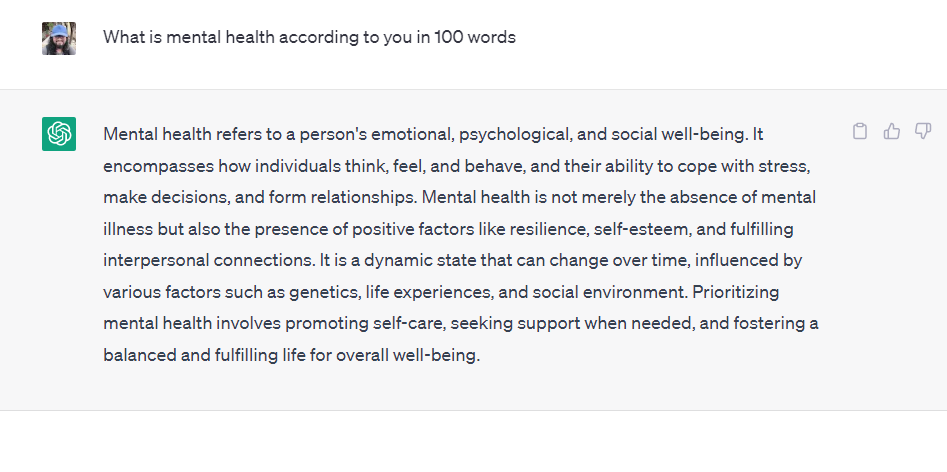
Excellent response. Each sentence is of high value to the reader. Each sentence gives a new detail that paints a global picture with precise details. Well done GPT. An uncomfortably large number of mental health professionals fail to describe mental health as a concept. GPT 1, pros 0. It speaks of emotions and social well-being, which is where problems lie for most. It speaks of stress, which is usually the tipping point for someone to seek help. It speaks of continuous changes. GPT telling the reader it’s not just the absence of mental problems but the presence of healthy relationships, self-esteem, and resilience (coping and bouncing back) is perfect. Both the angles (absence of illness and presence of positive factors) eventually lead to healthy coping and adjusting well in life, which really is the unsaid goal everyone likes to achieve.
Score 5/5
Question 2: What should I do if I wake up very tired and keep losing focus all day long?
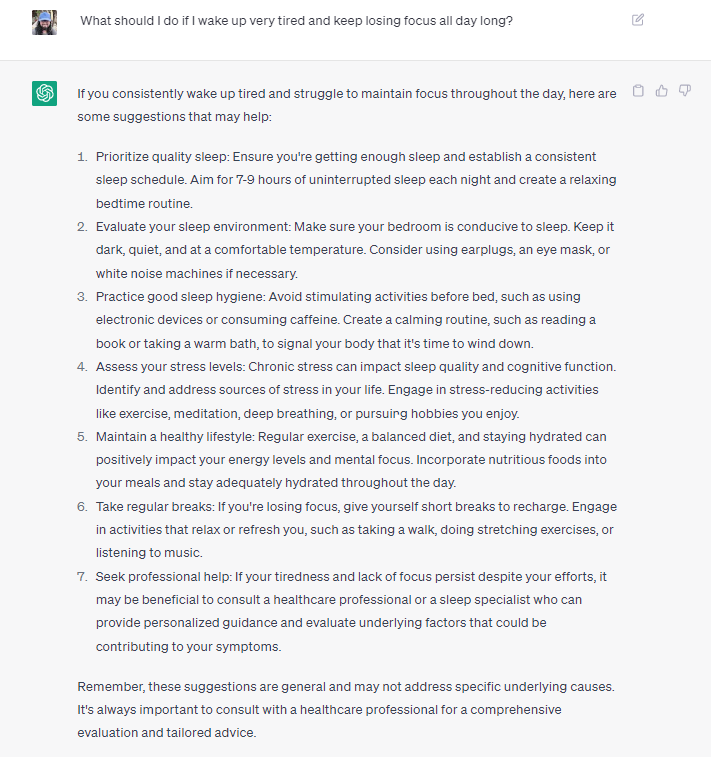
Good advice. All points are relevant and affect focus. This response can replace hundreds of videos and articles saying the same thing (including mine). But, as someone who has written a lot on human cognition, I won’t always look at lifestyle changes as an assumed problem for focus. Factors like how skilled you are and how challenged you feel at work, whether the work you are doing is meaningful, how intrusive thoughts (or daydreams) pop into the mind, and how you multi-task or procrastinate matter. For example, having a very challenging job will eventually make you lose focus IF you don’t have enough skill and knowledge because it creates anxiety, which the brain tries to reduce by diverting attention away. For positive emotions at work or during daily life, there needs to be a balance of skill and challenges. Just habits or unstimulating activities are bound to kill motivation and focus. Background chatter and noise also affect attention, because the brain is more tuned to human voices. Emotional problems like fear of failing, fear of feeling incompetent, and feeling the mental burden of work (anxiety) make people procrastinate because they need to constantly improve their mood by doing something else. These behaviors take the front-row seat.
At best, this response is factually correct, but it’s too incomplete to help a majority of readers.
Score 3.5/5
Question 3: Why am I not feeling anything in life? Have I gone cold or am I depressed?
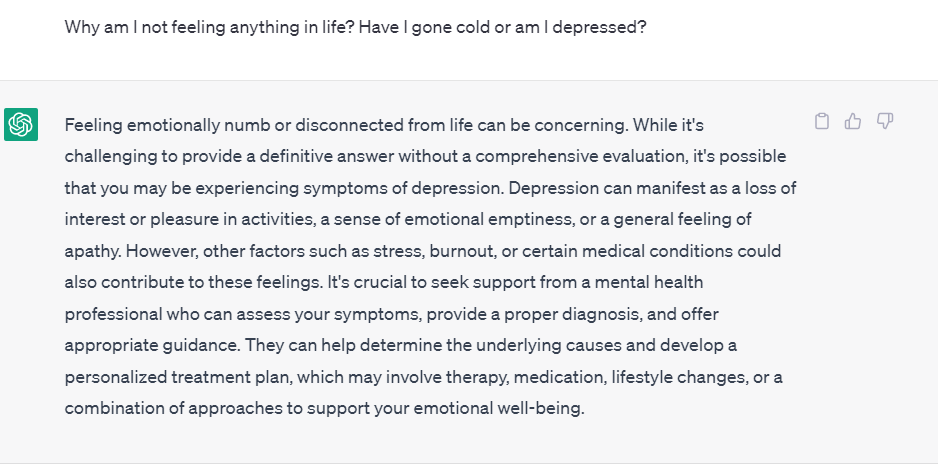
This may seem like an empty response at first because it doesn’t offer specific advice or solutions. That is exactly why it is a great response. The response is all about preparing humans for a path they may have to take. Surprisingly, when friends ask these questions to their friends, the responses range from “Yeah you sound depressed” to “It has to be your sleep” or something like “Bro you need to start meditating or read this book”. These are a lot less helpful and often dismissive.
Blunted affect is a situation where a person is unable to express emotions well through language, body language, and facial expressions. This is a common problem in depression, anxiety, and trauma.
Score: 5/5
Question 4: What 5 things can I do to protect my mental health at a very stressful job?
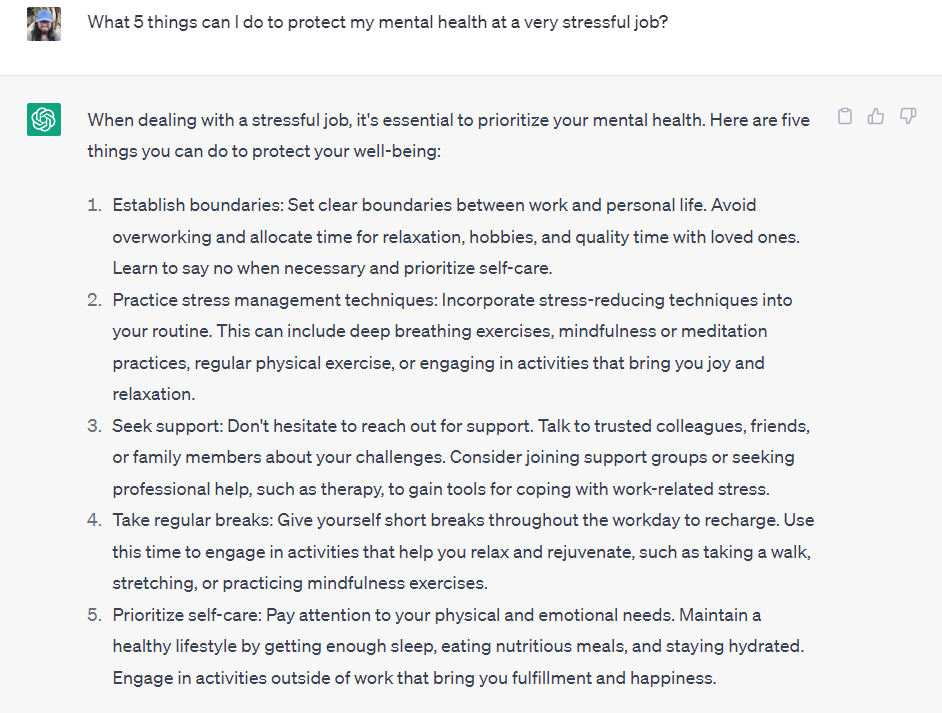
This response shows a hidden problem with taking advice from chatGPT. It assumes that the problem you are facing is caused by your behavior. It assumes that the job you are doing and your environment is unchangeable. The advice is sound in its own right, but it is not helpful enough. it focuses on “micro” coping mechanisms, not large changes. Almost like the advice is supposed to sound healthy but lacks usefulness. One has to consider if the job is sustainable and worth sacrificing mental health for. One has to consider if there is bad management and workplace toxicity. A therapist, friend, or mentor might explore the possibility of changing jobs, careers, or even the location of work. A point describing logistics and environmental factors would’ve made this answer a lot better.
Score: 2/5
Question 5: I just had a breakup and I am depressed, what should I do?
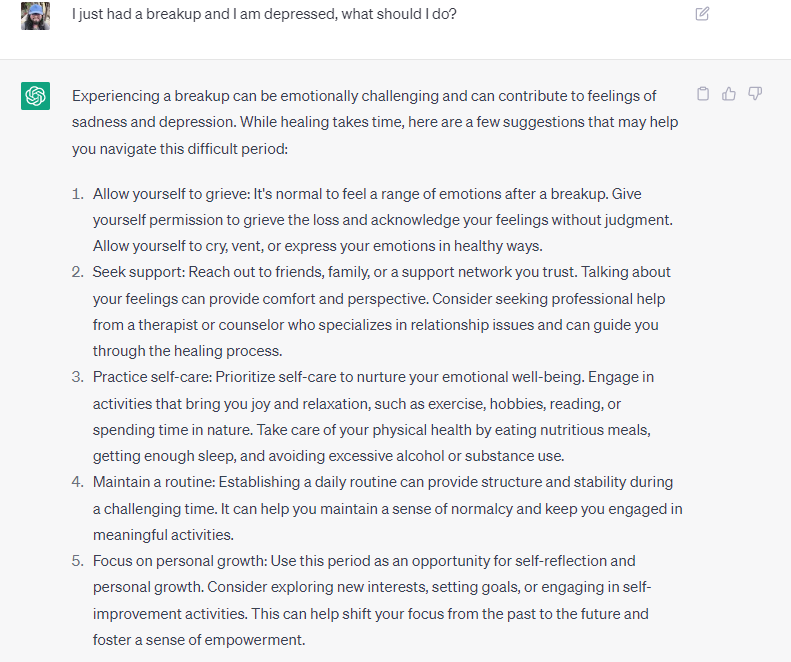
This is a mid response because it is too generic but validates the human. The first point is great and a person going through any loss – death, break up, theft, etc., needs to grieve and process the loss. Grieving is a very subjective process and people cope in many ways. The second point is good too, people help people heal. Sometimes you need professional help. Points 3 to 5 are good generic points that are not specific about breakups. They are things one should do anyway. But 3 very important problems after a break up are not covered here.
- Lack of stability – A partner is integrated into one’s life. Activities, locations, routines, etc., develop with the partner, which can worsen mood.
- Lack of closure – For many people, a breakup leaves questions unanswered. Why did this happen? What could’ve been different to save the relationship? Unanswered questions lead to intrusive thoughts, regret, guilt, and desperation to seek answers in any way possible.
- Loss of identity – a partner is a part of one’s identity. Shared likes and dislikes, shared appearances, similar points of view, similar topics to discuss, etc. This won’t be true for all, but it is true for many. After a breakup, chances are a person has to rebuild parts of their identity that do not include the partner.
Validating these 3 points would’ve been a good idea because it might be hard to ask specific questions about stability, closure, or identity.
Score: 3/5
Takeaway
I chose these questions based on what I get asked as a counselor, particularly in a casual setting. So it’s reasonable to consider people would ask an AI companion the same, considering the AI has more knowledge than any 1 single person.
- The responses are generally not harmful.
- The responses lack a big-picture view.
- The responses are closer to common sense than trustable concrete advice.
- The responses are fairly useful but often dramatically incomplete.

Hey! Thank you for reading; hope you enjoyed the article. I run Cognition Today to capture some of the most fascinating mechanisms that guide our lives. My content here is referenced and featured in NY Times, Forbes, CNET, and Entrepreneur, and many other books & research papers.
I’m am a psychology SME consultant in EdTech with a focus on AI cognition and Behavioral Engineering. I’m affiliated to myelin, an EdTech company in India as well.
I’ve studied at NIMHANS Bangalore (positive psychology), Savitribai Phule Pune University (clinical psychology), Fergusson College (BA psych), and affiliated with IIM Ahmedabad (marketing psychology). I’m currently studying Korean at Seoul National University.
I’m based in Pune, India but living in Seoul, S. Korea. Love Sci-fi, horror media; Love rock, metal, synthwave, and K-pop music; can’t whistle; can play 2 guitars at a time.



























